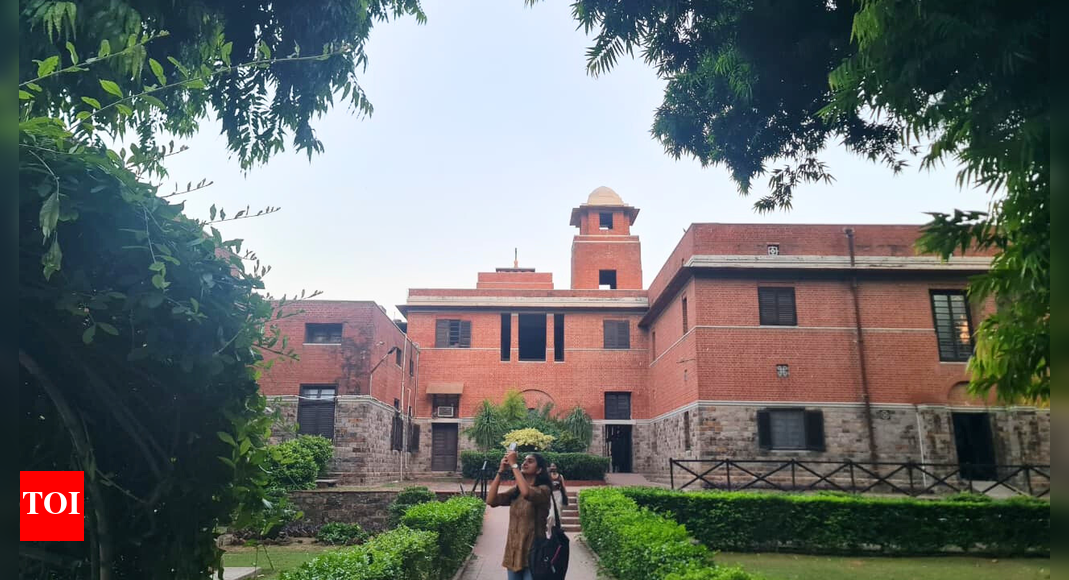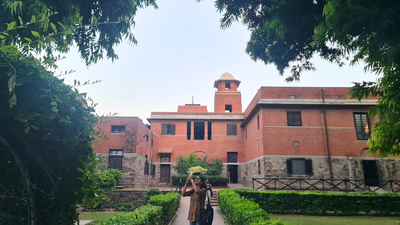
NEW DELHI: St Stephen’s College, affiliated with Delhi University, asked its first-year students to pay the university fee and college fee separately this year — creating a dual-payment route that violates DU’s single-portal payment rule, while also directing students to pay more than three times the university’s actual share in the total fees.As per the college’s 2025-26 fee notice, which has been seen by TOI, the ‘DU fee’ for most courses is listed between Rs 11,551 and Rs 11,630 for first-year students, even though DU’s official share is Rs 3,500 annually. The difference amounts to an overcharge of over Rs 8,000 per student – a 230% excess – which the students have already paid to confirm admission. St Stephen’s first-year intake, officials said, is roughly about 400, which means an extra Rs 32 lakh was paid to the university. For students in persons with disabilities (PwD) category, the college listed Rs 1,150 as the DU fee, while the university’s charge is Rs 875, a 31% excess.The notice directed students to pay the DU fee on the university’s portal and the college fee – ranging from Rs 17,500 to Rs 19,000 per semester – after joining. Together, this pushes the total payable amount for a regular BA or BSc programme to nearly Rs 30,000 per semester.TOI contacted other colleges like Miranda and Ramjas, which said their average first-year fee ranges from an annual total of Rs 16,000 to Rs 20,000 and Rs 15,000 to Rs 17,000, respectively, including the university’s share of Rs 3,500.The dual-payment arrangement at St Stephen’s is inconsistent with DU’s standard system. A DU official said the university was “not in cognisance” of the separate payment method or the inflated DU component listed by the college and was looking into the matter. “There is only one payment system. Students are required to pay their fees through the DU portal, from which the university keeps its share and transfers the rest to colleges. No other medium of payment can be created as per rules,” Haneet Gandhi, dean, admissions, told TOI.

Confirming that the university’s share was Rs 3,500 annually, Gandhi called the overcharge “the college’s fault”. Asked how the university plans to rectify the excess amount taken, she said, “The college should look into how to rectify the overcharge.”Gandhi also claimed that DU has already transferred 60% of the college’s share from the total fees received, i.e., Rs 11,551-11,630, from the students after keeping its share, and that the rest will be settled after admissions are over. This means the extra amount paid by the students this year as part of the DU share – Rs 32 lakh – has ultimately gone to the college. When contacted, the college’s bursar and public relations officer Chinkhanlun Guite, acknowledged St Stephen’s had created a separate payment route. “It was done for the convenience of students,” he said.Asked whether permission had been sought from the university to introduce the dual system, Guite said, “No such permission is required.” He declined to comment on why the ‘DU fee’ shown in the notice was nearly three times higher than what DU actually charges.Repeated calls and messages to college principal John Varghese seeking clarification on the inflated DU component and whether the excess amount would be refunded went unanswered.As per the process, colleges upload course- and category-wise details of the amount to be charged from students on the university portal. When students make the payment, they are shown a pre-filled amount on the portal. Following this, DU keeps its share and transfers the rest to the respective colleges.DU fees comprise several components – some retained by the university and others transferred to colleges towards facilities they provide, including tuition. DU’s share includes the University Welfare Fund and EWS Support Fund (Rs 250 each), and the University Development Fund and University Facilities and Services Fund (Rs 1,500 each).The development also comes in the backdrop of longstanding differences between St Stephen’s and DU over administrative autonomy and adherence to university rules. The college has in recent years defended its right to frame internal procedures – including conducting separate interviews for applicants – citing its minority status, while DU has maintained that affiliated colleges must follow common regulations.








